Japan should face up to its aggressive past
Updated: 2014-01-17 13:12
By Fang Li (China Daily USA)
|
||||||||
On Dec 26, 2013, Shinzo Abe, the Japanese prime minister, paid a blatant homage to the Yasukuni Shrine, where 14 Class-A war criminals of World War II are enshrined. He did so with complete disregard of the strong opposition from the Chinese people and other neighboring Asian countries. In the shrine, there were 28 Japanese political and military leaders convicted by an international military tribunal after WWII.
The war of aggression waged by Japanese militarism during 1930s and 1940s brought huge disasters to people in China and the Asian Pacific region. In the Japanese Invasion War, the Japanese killed 11,324,000 Chinese; most of the victims were women and children. In the Pearl Harbor attack, the Japanese killed 2,402 American soldiers, destroyed 250 fighter planes and 18 military vessels. The Japanese also invaded Korea and Southeast Asia, causing massive casualties.
But from Japan's point of view, there is no stain on its history. No one has ever had to take responsibility for all these acts. Japan has never made an effort to reflect on its aggressive past, either denying the atrocities or downplaying them with empty phrases such as "it was just war". No Japanese politician has ever shown a great gesture of atonement like Willy Brandt did when he got on his knees at a memorial to the Warsaw ghetto in 1970. Instead, they are keen to pay tribute to the Yasukuni Shrine, which is a spiritual tool and symbol of Japanese militarism in its war of aggression.
Why did the Chinese and Korean governments continue to express strong indignation and condemnation over Shinzo Abe's action? To us, the visits to the shrine by Japanese leaders cannot simply be an internal affair for Japan, or a personal matter for any Japanese official. Nor does it concern only China-Japan and Korea-Japan relations. These visits by their very nature are attempts to whitewash a history of aggression and colonialism by militaristic Japan, overturn the just trial of Japanese militarism by the international community and challenge the outcome of WWII and the post-war international order. At stake is the credit of that country's leaders in observing the purposes and principles of the UN Charter and upholding international peace. It is a choice between aggression and non-aggression, between good and evil and between light and dark. Regrettably, what Mr Abe did has raised the specter of militarism rising again in Japan.
Mr Abe's track record provides evidence. Since taking office in 2012, he has been talking enthusiastically about justice, democracy, peace and dialogue. But the reality is seen in his actions. He is unrepentant about Japan's militarist past and makes no apologies for it. He has openly questioned whether his country should be defined as an "aggressor", and did his utmost to gloss over its history of militaristic aggression and colonial rule.
In May 2013, Mr Abe caused great offence in China and Korea when he was photographed posing in a military jet boldly marked with the number 731. This was the code of an infamous Japanese biological warfare research facility performing human experiments in China during the war.
With these precedents, the world should be on high alert. Mr Abe wishes to amend the post-war pacifist constitution, imposed on Japan by the USA. Close attention should be paid to his colleagues, such as Taro Aso, the deputy prime minister, who asserted that Japan could "learn" from Nazi Germany about revising constitutions. Mr Abe has worked hard to portray China as a threat, aiming to sow discord among Asia-Pacific nations and create a convenient excuse for the resurrection of Japanese militarism.
Last year, China-Japan relations were also beset by the farce of Japan "purchasing" the Diaoyu Islands. More recently, Japan deliberately stirred up "China threat" hysteria in military and security fields to undermine China's security interests. Instead of reining in his acts, the Japanese leader has gone out of his way to once again create a serious incident on the issue of history. It has erected a new major barrier to the improvement and development of bilateral ties.
I would like to say a few more words about the Diaoyu Dao Islands. Diaoyu Dao and its affiliated islands are China's inherent territory in all historical, geographical and legal terms, and China enjoys indisputable sovereignty over Diaoyu Dao. Japan's occupation of Diaoyu Dao during the Sino-Japanese War in 1895 was illegal and invalid. After World War II, Diaoyu Dao was returned to China in accordance with such international legal documents as the Cairo Declaration and the Potsdam Proclamation. No matter what unilateral step Japan takes over Diaoyu Dao, it will not change the fact that Diaoyu Dao belongs to China. For quite some time, Japan has repeatedly stirred up troubles on the issue of Diaoyu Dao. On Sept 10, 2012, the Japanese government announced the "purchase" of Diaoyu Dao and its affiliated Nanxiao Dao and Beixiao Dao and the implementation of the so-called "nationalization". This is a move that greatly violates China's territorial sovereignty.
China and Canada were wartime allies. Seventy-two years ago, nearly 2,000 Canadian soldiers fought side by side with the Chinese people and Allied forces to defend Hong Kong from Japanese invasion. More than 500 Canadian soldiers lost their lives in the battle or died later in captivity. Seven decades have passed since that horrible war. Yet there are always some incorrigible people in Japan who show no signs of remorse for war crimes. Instead, they seek to reinterpret history. They pose a serious threat to global peace. The Chinese will not allow such attempts. I am sure Canada and all other peace-loving people will not remain indifferent.
China and Canada are both on the winning side of the Second World War, sacrificing tremendously in the fight against Nazism. We played a key role in establishing the post-war international order that has delivered great benefits for mankind. Our two countries have a common responsibility to work with the international community to oppose efforts to nullify its outcome. We should join together to uphold the UN Charter and to safeguard world peace.
The author is the Chinese Consul General in Toronto.
(China Daily USA 01/17/2014 page16)
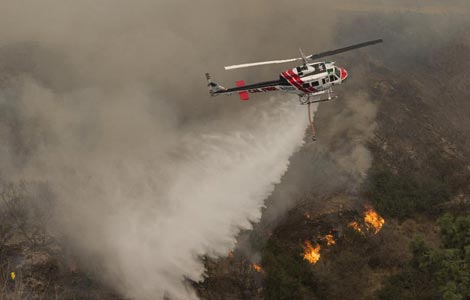
 Wildfire out of control in Los Angeles, US
Wildfire out of control in Los Angeles, US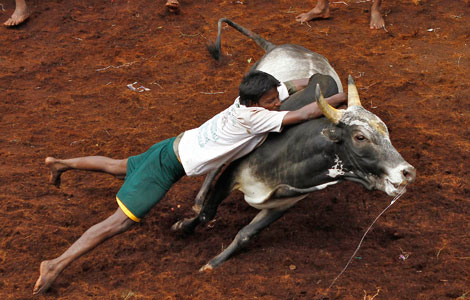
 Bull-taming festival kicks off in India
Bull-taming festival kicks off in India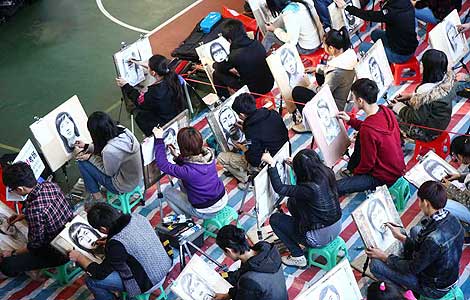
 Way to art school
Way to art school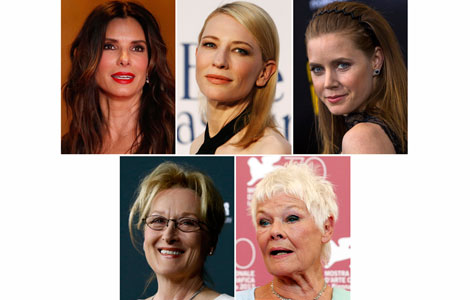
 'American Hustle,' 'Gravity' lead Oscar nominations
'American Hustle,' 'Gravity' lead Oscar nominations
 138th Westminster Kennel Club Dog Show to open
138th Westminster Kennel Club Dog Show to open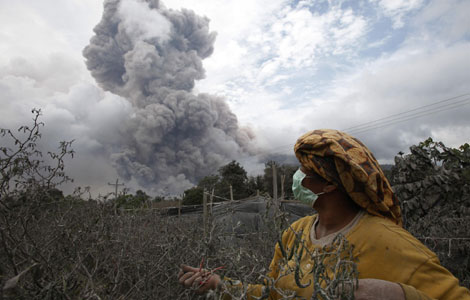
 Volcano displaces thousands in Indonesia
Volcano displaces thousands in Indonesia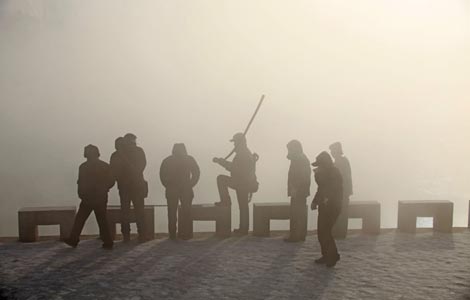
 China issues fog alerts
China issues fog alerts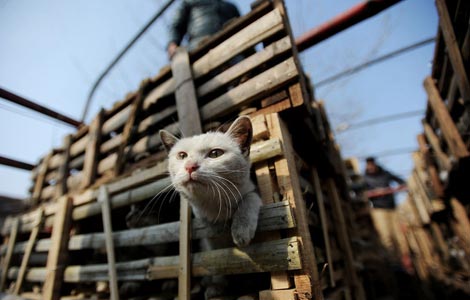
 Stray cats on the way to be slaughtered saved
Stray cats on the way to be slaughtered saved
Most Viewed
Editor's Picks

|

|

|
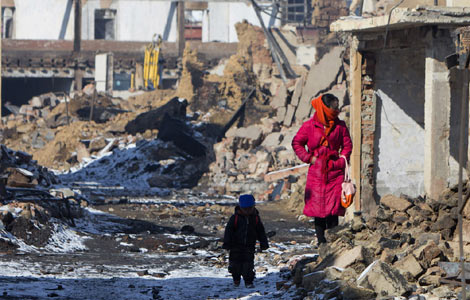
|

|

|
Today's Top News
US Treasury chief says high-level engagement 'welcomed'
Dirty air? Why not wash it?
He Xiaohui: A visionary rooted inservice
Auto-glass maker invests $200 million for US plant
Consul General lauds progress in 2013
Teaching English in China a good Plan B
China's US debt holdings reach record high
Asiana firefighters saw victim alive
US Weekly

|

|






